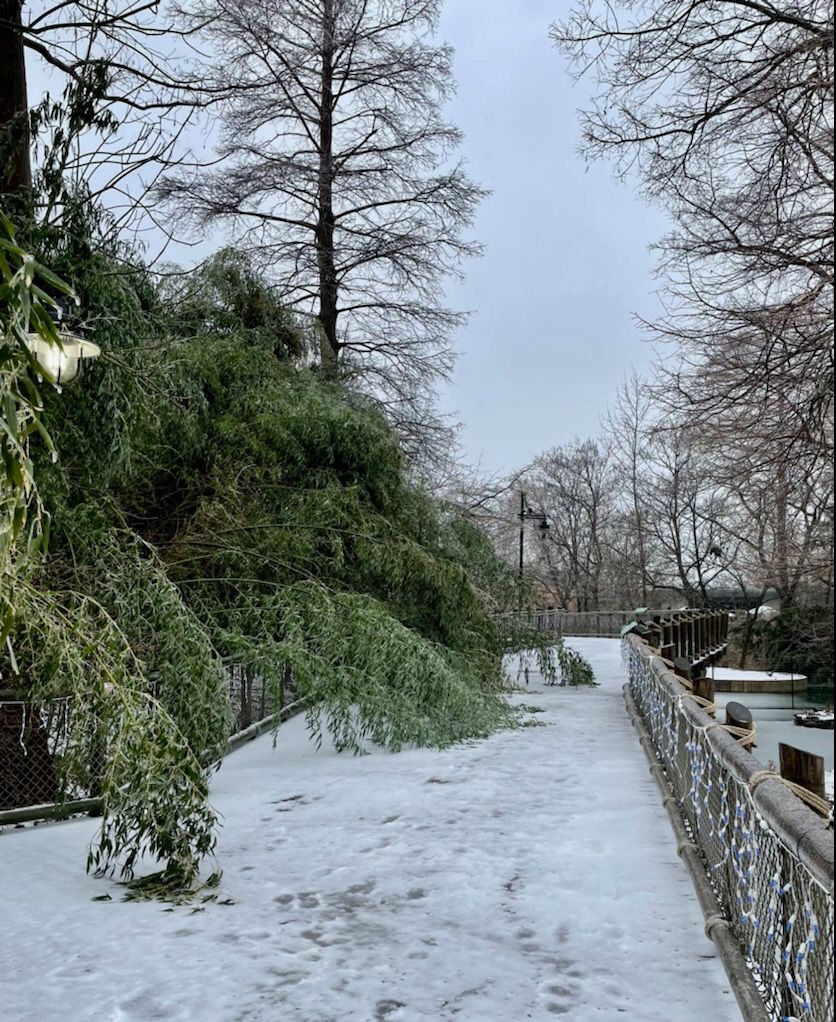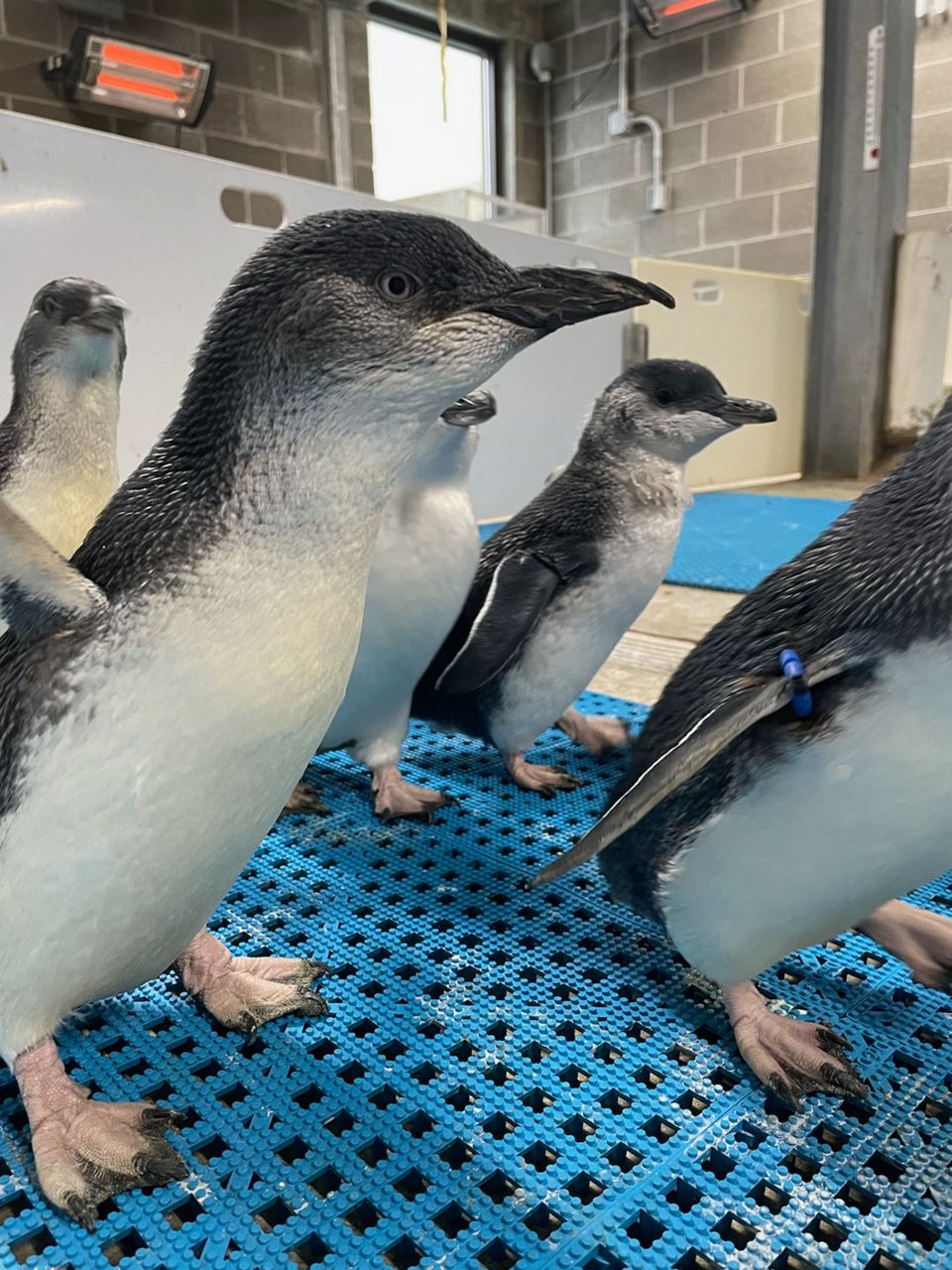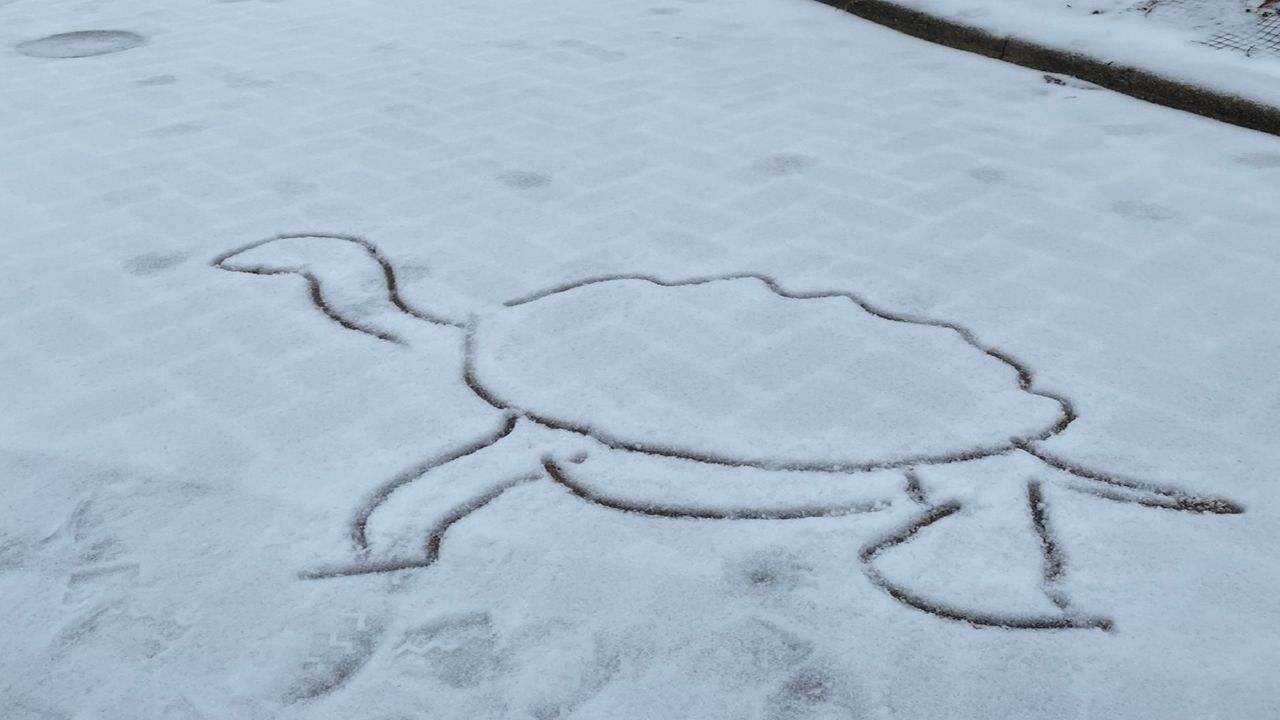CINCINNATI – The Cincinnati Zoo and Botanical Garden didn’t open to the public Thursday due to the threat of severe winter weather, including freezing rain, ice and frigid temperatures.
But while the zoo wasn’t open, it didn’t close — at least, not really. After all, they have hundreds of animals that need to be fed and cared for regardless of weather conditions.
What You Need To Know
- The Cincinnati Zoo and Botanical Garden closed Thursday and Friday due to severe weather
- About 50 zoo employees will sleep at the park overnight to care for the animals and buildings
- One of the biggest concerns is a power outage due to heavy ice
- This doesn't happen often in Cincinnati but it has happened before, including once last year
The move was made for the "health and safety of visitors and staff,” Thane Maynard, the zoo’s director, announced Wednesday afternoon. The park remains closed Friday as well.
“We don’t want our employees to risk dangerous commutes, and we’re concerned that icy conditions could make paths difficult for zoo guests to navigate,” Maynard said.

Similar organizations across southwest Ohio followed suit: Schools, restaurants, stores. Hamilton County shut down most of its business operations throughout the remainder of the workweek; only its essential personnel reported.
In response, the zoo made the unorthodox choice to have some of its employees live at the park Thursday night, or until conditions improve and it's safe for them to come and go safely.
“The keeper team always puts the animals first. They will make sure that all their needs are met, even if it means spending one or two nights at the zoo,” Maynard said.
One of those people camping out at the park is David Orban, the zoo’s director of animal science and strategy. He brought a pillow and a blanket and plans to sleep in his office. He picked out a cozy spot on the floor behind his desk.
“It’s important to make sure that our animals are having those great experiences 24 hours a day, seven days a week, 365 days a year,” Orban said. “We know that a lot of our animals will probably be sleeping overnight, which is great, that's normal for them. We just need to make sure that our buildings, you know, stay operational.”
Orban is one of 34 members of the zoo’s animal care team involved. This group will look after the animals to make sure they’re fed and doing well physically.
The zoo also called on about 20 other employees who work in other areas of the park – operations, facilities management, etc. – who will help keep the park running if something goes wrong.
A major concern is falling tree branches and powerlines, which could lead to a power outage. Even though the park is closed, they still need lighting, to run heating systems and to keep the filtration systems working for their aquatics exhibits.
Members of the horticulture team signed up for the overnight stay to protect some of the botanical gardens and ensure the structural stability of the park’s trees given all the ice.
“A lot of us will spend our time caring for the animals. But some of the others will do things like make sure paths remain usable and that buildings are operational in case we lose power,” Orban said. “We have the people to respond as necessary.”

Like Orban, some of the overnight team slept in their work area. Cots were set up in the education building and other spots across the 65-acre park.
Others stayed in a nearby house owned by the zoo that usually hosts interns. A few zoo employees, who live within walking distance to the park, agreed to be part of the overnight team. Some have colleagues as guests for the next couple days.
Staff members brought in bedding from home and everyone brought in snacks. The zoo’s food and retail partner, Systems Service Associates (SSA), prepared meals for those staying overnight, Orban said.
On Thursday night, several zookeepers made their way out into the snow and went sledding. It was their way to make "lemonade out of snow," according to Michelle Curley, the zoo's information officer. Curley said they waited until after the animals were tucked in.
“We should have plenty of food and plenty of comfortable accommodations. People brought in games, puzzles and whatnot, too” he added. “Assuming everything goes to plan, and there's nothing to worry about tonight, we'll just kind of hang out and remain ready for whatever comes our way.”
It’s not uncommon for zoos and aquariums in other cities to have weather response teams. Orban cited an example of a city prone to tropical storms as having a “ride-it-out crew” that will stay on-site for as long as the event goes on.
For Cincinnati though, it’s a little more rare. Orban said they have had people in the past who would stay overnight for winter weather events, “which, fortunately, Cincinnati doesn't get too many of.” They had one sleepover last year.
But this one is different. A lot of the staff was sent home early except for the weather crew and they won’t be back until the weather and road conditions improve, said Orban, who has been with the zoo for almost five years.
“This is a pretty unique event, but we're a unique sort of organization in that we care for living creatures and need to make sure that they're well supported and well cared for all hours of the day,” he said. “The weather doesn’t change that fact.”
Orban did not anticipate running into any problems, though he credits planning and being ready for the worst-case scenario.
“Hopefully everything goes to plan, everything stays operational, and you know, all of our power remains intact. But things happen and we just need to be prepared. The park does have gas-powered backup generators in the case of an outage.”

The team’s motto for the last few days has been “stay flexible and open minded.” “Fortunately, we have an incredible staff that is doing just that,” he said.
Orban is no stranger to cold weather and snow. He completed both his undergraduate and graduate school work in animal behavior and welfare at Michigan State University in East Lansing, Mich.
East Lansing gets about 46 inches every year compared to the national average of 26 inches. By comparison, Cincinnati gets about 15 inches.
Still, the animals at the Cincinnati Zoo are no strangers to snow. In fact, many of them quite like it – the red pandas, the snow leopards, the cougars, even a few species a person might not expect.
“We also have a lot of animals that we’ll allow outside in the snow for a short time, even if that's not normal to their environment,” Orban said, calling it an “enriching experience” for animals like the elephants and lions. “It's a little bit of fun for them. They love being able to get out to play around.”
Given the forecast, though, the zoo plans to keep most, if not all, of the animals inside for their safety. The timeline for when the animals will be let back outside will likely depend on how quickly things thaw.
The team and the animals are ready to hunker down for a day or more, if needed, Orban said.
“Our staff knows how to respond at events like that. Our animals are well prepared as well. We top off their water and food and make sure they have extra bedding,” he said. “Everyone should be good to go, but we’re just here if those worst cases play out.”



